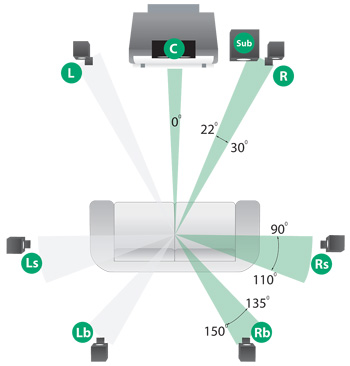|
|
 Re: M3's and in-ceiling mounting ?
|
Joined: Dec 2003
Posts: 6,331
axiomite
|

axiomite
Joined: Dec 2003
Posts: 6,331 |
Quote:
Quote:
I use direct radiators for my rears, and am considering moving them to my bedroom system and replacing them with dipoles that match my side surrounds.
Why? What are you unhappy about?
I don't think "unhappy" is quite the right word.
It is my opinion, and my opinion only, that if one uses 7.1 exclusively for HT, then multichannel speakers in the rear would provide a more satifying HT experience than using direct radiating speakers in the rear.
I put direct radiators in the rear because I love SACDs and DVDAs, and the common wisdom is that all speakers should be direct radiators when listening to multichannel music. The problem is that the correct position for direct radiating surrounds when listening to multichannel music is not where the surrounds should be for 7.1 movies. For multichannel music they should be approximately in the same location as your side surrounds, but at the same height as your mains and center.
 
So, either you are forced to be constantly moving your rear surrounds (depending on what you're listening to), or you live with your surrounds being in the wrong location part of the time.
I've got another reason for putting dipoles in the rear, but it only applies to me. When I started listening to multichannel music, I had a 5.1 setup only, with QS8s as my surrounds. I became accustomed to the sound of SACDs and DVDAs using multipolar surrounds mounted higher than they were supposed to be. I like it more than I like direct radiators in the correct position.
What I like multichannel music to do is expand the soundstage and give me the feeling I'm in a concert hall. I am not fond of the "you're in the middle of the band" feeling (ironic, since I was a professional musician  ), and the multipolar speakers, mounted higher than recommended, minimize that 'middle of the band feeling,' should the disc happen to be mixed that way. ), and the multipolar speakers, mounted higher than recommended, minimize that 'middle of the band feeling,' should the disc happen to be mixed that way.
So, yes, shame on me for not doing things they way they were intended. But, it's my room, my speakers, and my choice.  YMMV. YMMV.
Jack
"People generally quarrel because they cannot argue." - G. K. Chesterton
|
|
|
|
Forums16
Topics24,945
Posts442,485
Members15,617
| |
Most Online2,082
Jan 22nd, 2020
|
|
|
0 members (),
1,194
guests, and
4
robots. |
|
Key:
Admin,
Global Mod,
Mod
|
|
|
|
|
|



